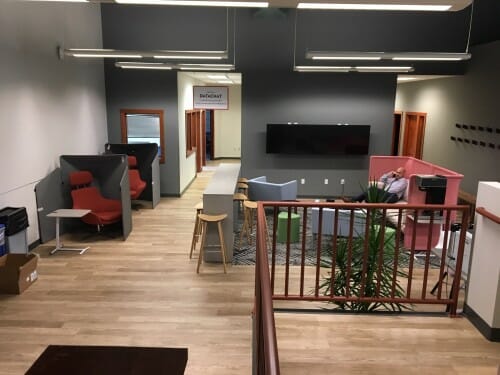UW startup DataChat democratizes data science
From February through June, we will highlight the ways that UW–Madison powers the state’s economy through research and innovation, educates the next generation and reaches out to Wisconsinites to improve their lives. February’s theme is Economic Prosperity. Watch for more at #CantStopABadger and #UWimpact on social media. Your support can help us continue this work.
DataChat, the fourth tech startup from University of Wisconsin–Madison computer sciences professor Jignesh Patel, makes data science accessible to anyone.
Founded in 2017, it has grown quickly to 20 employees and recently received $4 million in funding from Silicon Valley venture capital firms.
DataChat‘s growth illustrates the many ways UW–Madison nurtures startups that arise from university research. It received support and early funding from the Wisconsin Alumni Research Foundation and WARF Ventures and a home in the University Research Park @1403 site for its Madison headquarters.

Jignesh Patel Photo by: David Tenenbaum
“Our biggest supporter is WARF,” says Patel. “They made it possible; they’ve been our backbone. They’re amazing and easy to work with.”
Business users can “chat” with DataChat’s Conversational Intelligence (CI) platform to obtain insights from their data themselves, without programming expertise. This democratization of big data helps companies build their analytics capabilities easily and economically.
“Data science can be made available to anyone,” Patel says. “This type of skill is critical for organizations who need the next level of insights from data.”
“We used to think about Big Data analytics as something that was done by computer programmers, and now you’re seeing every industry having to harness data, but not every industry has the ability to compete for the kind of talent that is conversant in coding or data analytics,” says Aaron Olver, managing director of University Research Park. “DataChat is creating tools, using AI, to help people who aren’t technically trained create insights.”
Olver views DataChat as an essential solution for a broad range of companies.
 “Wisconsin has many insurance companies and manufacturing supply chains that might not have access to the talent and tools they need to compete, without this type of bridging technology,” Olver says. “DataChat is going to be fun to watch because of Jignesh’s track record and because the problem they are working on is becoming more of a threshold issue in almost every industry.”
“Wisconsin has many insurance companies and manufacturing supply chains that might not have access to the talent and tools they need to compete, without this type of bridging technology,” Olver says. “DataChat is going to be fun to watch because of Jignesh’s track record and because the problem they are working on is becoming more of a threshold issue in almost every industry.”
Patel has a history of tech startup success. He says he focuses his research on problems he anticipates society facing in five to ten years. After that amount of time passes, he determines whether his proposed solutions can be commercialized.
“All my startups incubated from research,” Patel says. “Our research is far-forward looking—not all ideas make it into the commercial track.”
Early funding for DataChat came from America’s Seed Fund, a National Science Foundation program, and the state of Wisconsin. In the fall of 2020, Patel secured $4 million in funding from Silicon Valley investors.
Now that DataChat has secured Series A funding, the company is building out its product.
“Building products that are simple to use is hard,” says Patel. “We offer our users a simple and intuitive way to carry out data analytics. Behind this simplicity is a sophisticated set of technologies, and developing that into a cohesive product takes fuel. The funding provides us that fuel.”

The University Research Park on Madison’s west side is the home of DataChat and other innovative companies. DataChat is in @1403, a building owned by University Research Park that’s been rebranded as a center of gravity for startups. Photo: Bryce Richter
The funding also allows DataChat to grow its team.
“We have doubled the size of our team over the last four months,” says Patel. “We have about 20 employees now and are still hiring.”
“Jignesh is an all-star researcher who is remarkably good at finding and retaining talent,” says Greg Keenan, Senior Director – Venture and Accelerator at WARF Ventures. “The business intelligence market is exploding with opportunity. I think he is a remarkable leader and a great technologist.”
Patel describes UW as a nurturing environment and hopes university researchers remember that they have the capability to take research to product.

The interior of the @1403 building where DataChat operates. Photo courtesy of University Research Park
“WARF is super critical in doing that,” Patel says. “We need to continue to complete the cycle from inception to product fruition, if we can, and be the people who take great ideas to market.”
DataChat contributes to Wisconsin’s economy in two key ways. Most of the company’s new employees are recent UW grads, so the company is keeping talent in-state. Plus, the company plans to stay in Madison—in fact, that’s a key point in Patel’s pitch deck for investors.
“Our investors have confidence we can build a tech company headquartered in Madison,” Patel says. “Arguably, we are working on the hottest problem in data, the holy grail for what everyone wants to get to. We hope this is a show of confidence in building a big company here. This builds excitement around Madison.”
Patel says he’s observing a sea change in Wisconsin in terms of a greater focus on local businesses.
“There’s a lot happening here,” he says. “The coasts have been hiring our students to build their technologies, but we should keep the top ones here.”
Patel is dedicated to cultivating local tech entrepreneurs. He started the free, semester-long venture creation program CS NEST in the Computer Science department. He is also a co-site lead for the Creative Destruction Lab, a collaboration between the School of Computer, Data, and Information Sciences and the Wisconsin School of Business that aims to foster innovative startups.
Olver describes DataChat as a quintessential example of a UW startup.
“Jignesh is raising the prestige of UW–Madison and the School of Computer, Data, and Information Sciences,” Olver says. “He’s taking research and knowledge that is being developed on campus and translating it into this analytics company that is going to democratize the way we do data analytics.”
UW-Madison contributes $20.8 billion per year to the Wisconsin economy, and UW–Madison related start-ups contribute an additional $10 billion. Read more here.



